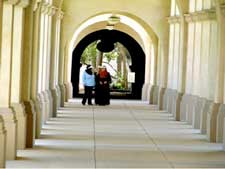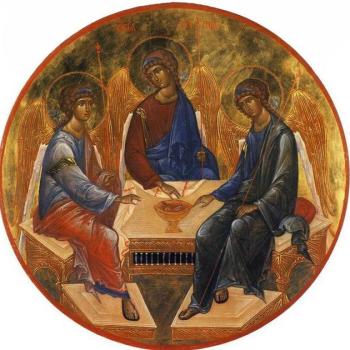"To me, much of that is McCarthyism, pure and simple," he said. "There are people out there who have an agenda to try to prevent what we are doing."
Discussion of political conflict often can serve as the death knell for dialogue groups. Sumaya Abubaker, who participated in the Los Angeles-based Jewish-Muslim group New Ground, said another interfaith group she had joined in the past had quickly fizzled out in part because it lacked structure and too quickly moved into discussions about volatile topics.
By contrast, New Ground participants met regularly for some time before they talked about the Palestinian-Israeli conflict, Abubaker said, eventually discussing the subject at a retreat. By then, members had gotten to know each other and they had practiced using communication skills they had learned. The retreat was carefully organized, with one session focused solely on discussing disputed terms, such as "terrorist" and "apartheid."
Abubaker said she has found her overall experience with New Ground to be life-changing.
"Before, when I heard the word Israel, the first thing that came to mind was the (Palestinian-Israeli) conflict," she said. "Now, what comes to mind is Jewish friends."
Humans together
Like many dialogue groups, the West Los Angeles Cousins Club indirectly got its initial boost from the Sept. 11 attacks, as it branched off from another group that formed during that time.
Members of the Cousins group have studied books that correspond with their faith traditions and they regularly talk about their own spiritual experiences. They also pray together, have special events during religious occasions such as Ramadan and the Jewish high holidays, and discuss what is going on in their daily lives.
Chishti recounted how a Jewish member of the group phoned her after her mother had died.
"I can't tell you how profound it was that she wanted to know about my mother in such a sincere way," Chishti said.
On some occasions, such as during the recent Gaza invasion, the group will discuss aspects of the Israeli-Palestinian conflict, but it is never to debate who is wrong and who is right. During their January meeting, the women decided to collect money afterward to help the families of those who live in Gaza. Normally, the women collect money for Jewish World Watch to help victims in the Darfur conflict.
By discussing matters of faith, members say they have grown spiritually. Member Judith Rivin noted that she had learned about the concept of surrender to God from Muslims, while Chishti said she had learned about "yelling at God" from Jewish women in the group.
Both Rivin and Chishti noted that peaceful coexistence between Muslims, Christians and Jews thrived in Spain during certain periods of the Middle Ages. In a sense, they say they are just reviving the tradition.
That does not mean that such relationships come without challenges. One member of the Cousins group is an Orthodox Jew, and fellow believers have told her that it is a sin to participate in the interfaith group. Likewise, some Muslim women in the group attend mosques where people question their reasons for meeting with Jews.
Such friendships can be even more shocking to those in other parts of the world. Rivin recalls meeting up with a Jewish woman from Kazakhstan and telling her that many of her new friends were Muslims.
The Kazakhstani woman's jaw dropped, and she asked, "What do you mean, friends?"
 Religious minorities in Kazakhstan, including Jewish people, have suffered persecution, Rivin explained. By contrast, she told the woman how Muslim members of the group had nurtured her.
Religious minorities in Kazakhstan, including Jewish people, have suffered persecution, Rivin explained. By contrast, she told the woman how Muslim members of the group had nurtured her.
Finally, the Kazakhstani woman's eyes lit up, and she understood.
"Oh, you mean you're humans together," she replied.
Perhaps that statement sums up the work of the group: bringing together women from Islam and Judaism for community and conversation.
The Future of Dialogue
While Gustav Niebuhr and Leonard Swidler say Muslim-Jewish dialogue is on the rise, Loskota says it is hard to tell. Some people see dialogue as innovative, while for others it is something they tried a long time ago.
Certainly, there is nothing new about interactions between people of the two faiths. Jews and Muslims have been in conversation - albeit not always with the intention of listening to one another - since the days of Mohammed, when the Qur'an recognized Jews as "people of the book."
Still, a few emerging trends appear to be developing. For instance, Chishti said much has changed with the advent of the Internet, as it has allowed those who are interested in dialogue to network much more easily than in the past.




